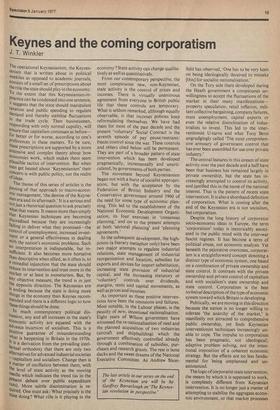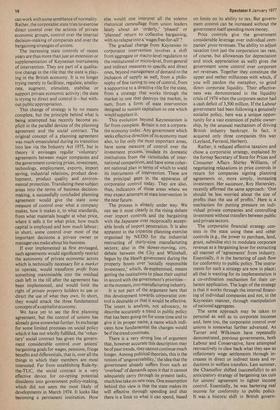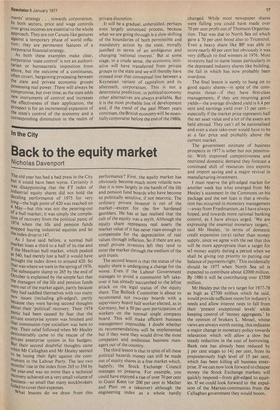Keynes and the coming corporatism
J. T. Winkler The operational Keynesianism, the Keynesianism that is written about in political weeklies as opposed to academic journals, consists of a small set of prescriptions about the role the state should play in the economy. To the extent that this Keynesianism-inpractice can be condensed into one sentence, it suggests that the state should manipulate taxation and public spending to regulate demand and thereby stabilise fluctuations in the trade cycle. Then businessmen, responding with only normal cupidity, will ensure that capitalism continues as before— for better or for worse, according to one's Preferences in these matters. To be sure, these prescriptions are supported by a more extensive and complex theory about how economies work, which makes them seem
Plausible tactics of intervention. But when Men get heated about 'Keynesianism' their concern is with public policy, not the realm of ideas.
The theme of this series of articles is the Passing of that approach to macro-econo
m. lc management, 'the demise of the Keyne
sian era and its aftermath.' It is a serious and not just a rhetorical question to ask precisely What that means. It means more than simply that Keynesian techniques are becoming discredited because they are increasingly failing to deliver what they promised—the control of unemployment, increased investment or a general effectiveness in dealing With the nation's economic problems. Such an interpretation is indisputable, but insufficient. It also becomes more hortative than descriptive when allied, as it often is, to a remedial injunction that the state should reduce its intervention and trust more in the Market or at least in monetarism. But, by any objective measure, the trend is in just the opposite direction. The Keynesian era is ending because the state is doing more things in the economy than Keynes recommended and there is a different logic to how these things should be done.
In much contemporary political disclission, any and all increases in the state's economic activity are equated with the advance incursion of socialism. This is a Positive guarantee of misunderstanding What is happening in Britain in the 1970s.
It is a derivation from the prevailing intellectual orthodoxy that there are only two
alternatives for advanced industrial societies --capitalism and socialism. Change then is a Matter of oscillation between them, with
the level of state activity as the moving needle which indicates the trend (as in the Present debate over public expenditure
ellts). More subtle discrimination is required. One must ask: What precisely is the state doing? What rale is it playing in the
economy ? State activity can change qualitatively as well as quantitatively.
From our contemporary perspective, the most conspicuous new, non-Keynesian, state activity is the control of prices and incomes. There is virtually unanimous agreement from everyone in British public life that these controls are temporary. What is seldom remarked, although equally observable, is that incomes policies keep reformulating themselves. We have had them for most of the past decade and the present 'voluntary' Social Contract is the seventh episode of pay pause/restraint/ freeze/control since the war. These controls and others cited below will be permanent. They are part of a broader pattern of state intervention which has been developed pragmatically, incrementally and unarticulated, by governments of both parties.
The movement beyond Keynesianism began not with a burst of socialist appropriation, but with the acceptance by the Federation of British Industry and the Conservative government around 1960 of the need for some type of economic planning. This led to the establishment of the National Economic Development Organisation, its four exercises in 'consensus planning,' and on to the present attempts at both `sectoral planning' and 'planning agreements.'
In the subsequent development, the highpoints (a literary metaphor only) have been two major attempts to regulate industrial relations, state management of industrial reorganisation and location, subsidies for exports and devices for import substitution, increasing state provision of industrial capital, and the increasing statutory or 'voluntary' controls over dividends, margins, rents and capital movements, as well as prices and incomes.
As important as these positive interventions have been the omissions and failures.
Most notable, in the Labour phases, is the paucity of new, intentional nationalisation.
Eight years of Wilson government have
witnessed the re-nationalisation of steel and the planned acquisition of two industries
(aircraft and shipbuilding) which the government effectively controlled already through a combination of subsidies, pur chases and research grants. The rest is lame ducks and the sweet dreams of the National Executive Committee. As Andrew Shon field has observed, 'One has to be very keen on being ideologically deceived to mistake [this] for socialist nationalisation.'
On the Tory side there developed during the Heath government a conspicuous unwillingness to accept the fluctuations of the market in their many manifestations— property speculation, retail inflation, militant collective bargaining, company failures, mass unemployment, capital exports or even the relative disinclination of industrialists to invest. This led to the interventionist U-turns and what Tony Benn ungrudgingly called 'The most comprehensive armoury of government control that has ever been assembled for use over private industry.'
The central features in this stream of state activity over the past decade and a half have been that business has remained largely in private ownership, but the state has increasingly attempted to control its activity, and justified this in the name of the national interest. That is the pattern of recent state intervention. It is also a shorthand definition of corporatism. What is coming after the end of the Keynesian era is not socialism, but corporatism.
Despite the long history of corporatist socio-economic ideas in Europe, the term 'corporatism' today is inextricably associated in the public mind with the inter-war fascist regimes. It has become a term of political abuse, not economic analysis. Yet beneath the pejorative overtones, corporatism is a straightforward concept denoting a distinct type of economic system, one based on a combination of private ownership and state control. It contrasts with the private ownership and private control of capitalism and with socialism's state ownership and state control. Corporatism is the best technical description of the type of economic system toward which Britain is developing.
Politically, we are moving in this direction because the nation is no longer willing to tolerate 'the anarchy of the market,' is manifestly not attracted to comprehensive public ownership, yet finds Keynesian interventionist techniques increasingly unable to cope. The impulse to corporatism has been pragmatic, not ideological; adaptive problem solving, not the intentional imposition of a coherent economic strategy. But the effects are no less fundamental for being umplanned and unannounced.
The logic of corporatist state intervention, the means by which it is supposed to work, is completely different from Keynesian intervention. It is no longer just a matter of attempting to stabilise the aggregate economic environment, so that market processes can work with some semblance of normality. Rather, the corporatist state tries to exercise direct control over the actions of private economic groups, control over the internal decision-making of companies and over the bargaining strategies of unions.
The increasing state controls of recent years are thus more than just an extension or supplementation of Keynesian instruments of intervention. They are part of a qualitative change in the role that the state is playing in the British economy. It is no longer trying merely to facilitate, regulate, ameliorate, augment, stimulate, stabilise or support private economic activity; the state is trying to direct and control it—but without public appropriation.
This change of strategy is by no means complete, but the principle behind what is being attempted has recently become explicit in the parallel devices of the planning agreement and the social contract. The original concept of a planning agreement was much emasculated during its transition into law via the industry Act 1975, but in theory it envisages regular 'voluntary' agreements between major companies and the government covering prices, investment, technology, employment, exports, import saving, industrial relations, product development, product quality and environmental protection. Translating these subject areas into the terms of business decisionmaking, a successfully concluded planning agreement would give the state some measure of control over what a company makes, how it makes it, to what standards, from what materials bought at what price, where it sells it for what price, how much capital is employed and how much labour; in short, some control over most of the important decisions a private owner or manager can make about his business.
If ever implemented as first envisaged, such agreements would significantly restrict the autonomy of private economic actors which is technically necessary for a market to operate, would transform profit from something maximisable into the residual cash left in the till after the agreement has been implemented, and would limit the right of private property holders to use or direct the use of what they own. In short, they would attack the three fundamental concepts of a capitalist economy.
We have yet to see the first planning agreement, but the control of unions has already gone somewhat further. In exchange for some limited promises on social policy which it has not wholly fulfilled, the 'voluntary' social contract has given the government considerable control over unions' bargaining goals for wages, pensions, fringe benefits and differentials, that is, over all the things in which their members are most interested. Far from establishing Rule-bythe-TUC, the social contract is a very effective device for co-opting potential dissidents into government policy-making, which did not seem the most likely of developments in March 1974. It looks like becoming a permanent institution. How
else would one interpret all the solemn rhetorical camouflage from union leaders lately about an 'orderly,' phased' or 'planned' return to collective bargaining, with no relapse into a 'wages free-for-all'?
The gradual change from Keynesian to corporatist intervention involves a shift from aggregate or macro-level regulation to the institutional or micro-level, from general and indirect measures to specific and direct ones, beyond management of demand to the inclusion of supply as well, from a philosophy of fine tuning to one of control, from a supportive to a directive rele for the state, from a strategy that works through the market to one that destroys the market, in sum, from a form of state intervention designed to sustain capitalism to one which would supplant it.
This evolution beyond Keynesianism is far from complete. Britain is not a corporatist economy today. Any government which seeks effective direction of its economy must also, to list only the most important areas, have some measure of control over the investment process, insulate its domestic institutions from the vicissitudes of international competition, and have some coherent national plan in terms of which to wield its instruments of intervention. These are the principal gaps in the apparatus of corporatist control today. They are also, thus, indicators of those areas where we may expect attempts at state intervention in the near future.
The process is already under way. We can see it most clearly in the rising debate over import controls and the bargaining with the Japanese over reciprocally acceptable levels of import penetration. It is also apparent in the tripartite planning exercise organised by NEDO for the industrial restructing of thirty-nine manufacturing sectors ; also in the slower-moving, coy, debate between the City and Whitehall, begun by the Heath government during the property boom over 'socially responsible investment,' which, de-euphemised, means getting the institutions to place their capital in accord with the government's priorities— at the moment, into manufacturing industry.
It is not part of the argument here that this development towards corporatist control is desirable or that it would be effective. The intent is analysis, not advocacy, to describe accurately a trend in public policy that has been going on for some time and to give it its proper name, a name which indicates how fundamental the changes would be if the trend continues.
There is a very strong line of argument that, however accurate this description may be of past trends, they cannot continue much longer. Among political theorists, this is the notion of 'ungovernability,' the idea that the government already suffers from such an 'overload' of demands upon it that it cannot adequately carry through its present tasks, much less take on new ones. One assumption behind this view is that the state makes its will effective through spending and that there is a limit to what it can spend, based on limits on its ability to tax. But government control can be increased without the government itself spending more money.
Price controls give the government considerable leverage over individual companies' gross revenues. The ability to adjust taxation (not just the corporation tax rate, of course, but allowances for depreciation and stock appreciation as well) gives the government some control over corporate net revenues. Together they constitute the upper and nether millstones with which, if you will pardon the metaphor, to grind down corporate liquidity. Their effectiveness was demonstrated in the liquidity crisis of 1974 when the corporate sector had a cash deficit of 3,500 million. If the Labour government had been following a genuinely socialist policy, here was a unique opportunity for a vast extension of public ownership, by the unusual mechanism of driving British industry bankrupt. In fact, it acquired only three companies this way (Leyland, Ferranti, Herbert).
Rather, it reduced effective taxation and chose a corporatist strategy, explained by the former Secretary of State for Prices and Consumer Affairs Shirley Williams, of negotiating relaxations in price controls in return for companies signing planning agreements or, more simply, increasing investment. Her successor, Roy Hattersley, recently affirmed the same approach; 'One should be less worried about the size of profits than the use of profits.' Here is a mechanism for putting pressure on individual private companies and controlling investment without transfers between public and private sectors.
The corporatist financial strategy consists in the state using these and other controls (e.g., the power to purchase, lend, grant, subsidise etc) to modulate corporate revenue as a bargaining lever for extracting all manner of 'agreements' from industry. Essentially, it is the bartering of cash flow for conformity to public policy. The instruments for such a strategy are now in place; all that is wanting for its implementation is a co-ordination mechanism for their coherent application. The logic of the strategy is that it works through the internal financing of individual companies and not, in the Keynesian manner, through manipulation of national aggregates.
The same approach may be taken to personal as well as to corporate incomes and, here too, the corporatist control over unions is somewhat further advanced. As Turner and Wilkinson have repeatedly demonstrated, previous governments, both Labour and Conservative, have attempted retroactively to claw back what they saw as inflationary wage settlements through increases in direct or indirect taxes and reductions in welfare transfers. Last summer, the Chancellor shifted (successfully) to an anticipatory strategy of bargaining tax cuts for unions' agreement to tighter income control. Essentially, he was bartering real income for conformity to public policy. It was a historic shift in British govern ments strategy . . . towards corporatism. In both sectors, price and wage controls over gross incomes are essential to the whole approach. They are not Canute-like gestures against a temporary phase of world inflation: they are permanent features of a corporatist financial strategy.
As both these examples make clear, corporatist 'state control' is not an authoritarian or bureaucratic imposition trom above, but the outcome of a continuous, Often covert, bargaining processing between the state and private economic groups Possessing real power. There will always be compromise, but over time, as the state adds new instruments of control and increases the effectiveness of their application, the Prospect is for an incremental expansion of the state's control of the economy and a corresponding diminution in the realm of private discretion.
It will be a gradual, unheralded, perhaps even largely unnoticed process. because what we are going through is a slow shifting of the boundaries of both permissible and mandatory action by the state, morally justified in terms of an ambiguous and changing 'national interest.' But at some stage, in a crude sense, the economic initiative will have transferred from private groups to the state and we will thereby have crossed over that conceptual line between a Keynesian variant of capitalism and its aftermath, corporatism, This is not a determinist prediction; in political economy other alternatives are always available. But it is the most probable line of development and, if the trend of the past fifteen years continues, the British economy will be essentiallycorporatist before the end of the 1980s.




































 Previous page
Previous page